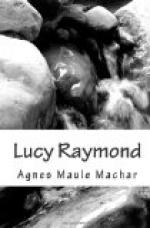“My dear Lucy,” she wrote, “while it is well that you should always cherish your dear father’s memory, and keep his counsels and his example always with you as a protecting influence, beware of trusting too much to this. He himself would have told you that it is not him you are to follow, but Him whom he followed, ’Jesus Christ, the same yesterday, to-day, and for ever.’ This alone can be our strength. Time is strong against our deepest sorrow, and no influence can permanently hold, except the constraining love of Christ. Never lose the habit of looking steadily to Him, and to Him alone, for daily and hourly strength.”
It was wise counsel, and Lucy in time came to find out how true it was.
It is needless to dwell upon the pain of the breaking up,—the packing up and stowing away treasured possessions, so closely associated with the times now passed away; the sorrowful leave-takings of old friends, who felt as if they were losing the last link with their beloved minister in the departure of his family; the sad farewell looks at all the well-known home objects, the flower-beds, the gravel walks, the shrubs and trees, every twig of which had such a familiar look. Many a time it seemed as if it must be only a sad dream, that all these things were about to pass from her daily life into a vision of memory. Happily it was winter. Had it been in the fair flush of summer, when her home looked its loveliest, the parting would have been far harder. As it was, it was hard enough; but she tried to conceal her sorrow from those to whose pain it would have added, though many a tear was secretly shed over even the old grey cat and the gentle petted cow, which were almost home friends.
At last all the preparations were completed. The house, stripped of most of its familiar furnishings, wore already a strange, uncomfortable aspect, full of packing-cases and confusion. Fred had already been obliged to return to college, and Lucy was to be the next to go. Alick was to escort her to the next railway station, and see her on the train which was to take her to the city. It was the first time she had ever travelled alone, and she rather dreaded it; but she knew that it would be very inconvenient for Alick to accompany her the whole way, and she would not admit that she thought the solitary journey at all a formidable one.
Poor Nelly, who grieved as much for her friend’s departure as she had done for her father’s death, came on the last morning to say good-bye, although Lucy had already taken leave of her and Bessie at Mill Bank Farm, and had made the latter promise to write to her sometimes.
“And it’s sorry I am, Miss Lucy, you’re going, and you so good to me,” sobbed Nelly, when she felt the parting moment was really come.
“Well, Nelly, we must both try to remember our Friend in heaven, who has been so good to us both. You love Him, I hope, Nelly, and pray to Him always?”
“Indeed I do, and I always pray God to bless you, Miss Lucy.”




